Beijing Blog Part 12: Living in the countryside.
July 5-7, 2009-(Hongcun – Anhui Province, China)
The second leg of our journey took us straight into the Chinese country-side as we lived three days in Hongcun, one of the few villages in China that was “outsider” friendly. I don’t really want to say “tourist” friendly, because in all honesty, in the three days we were there, we never saw any other “tourists”.
The first thing you immediately notice about the Chinese countryside is how disparate the level of income is between the urban and the rural. Any comparative government textbook about China will tell you that there is a huge difference between the rural and the urban and that people in the cities sometimes earn as much as 10 or 15 times more than that of the rural. The very same textbook will also tell you of how the rural areas are barely represented in the government, and how there is a large shift in workers from the rural to urban areas.
Yet, reading words off a page in Swem Library is nothing compared to seeing the real thing for yourself. And at first, you feel a
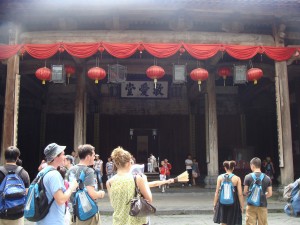
A courtyard of a house in the village. This mansion used to belong to a Qing Dynasty government official.
sense of regret and pity for these people, until you realize that it’s a way of life, and that it’s always been this way for centuries.
The village we stayed in was named “Hongcun”, or literally Hong Village. The village, famous for being one of the locations where they filmed part of Crouching Tiger Hidden Dragon, is one of the many villages in that region protected as a National
Heritage Site. Therefore, after a certain point in the township, all the buildings are as they were since the dynastic era.
Inside this township is where we stayed the night. Our tour group, being 35 people strong, was actually too much for one bed & breakfast style country inn to handle, so they actually ended up breaking us up into three different groups. In our specific groups, we actually ended up running out of regular rooms, so they ended up giving me and three other people a house on the outskirts of the complex.
Now, the first thing you must keep in mind when living in the countryside, is that it’s not always missing modern technology. Our inns were, thankfully, stocked with air conditioners, a western-style toilet, and even a washing machine. The only problem was the bugs and hot water.
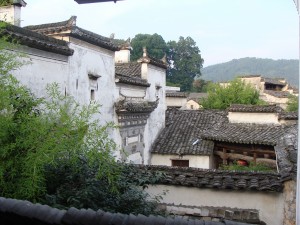
A view of the village from the inn that we stayed at. The architechture of the roof has remained the same since the dynastic eras.
Speaking of bugs, they must have not used our house in quite a while because from the moment we walked in, we saw four humongous spiders. And by humongous, I’m not kidding, it was literally the size of your palm, but flat, almost paper-thin. Not only that, mosquitoes were a constant concern.
As for the hot water, now here was the interesting part. The house operated with a propane tank like any other country house in America, except the tank was located, quite literally, in the middle of the kitchen. Also, since the furnace was also in the kitchen, whenever you turned on the hot water, a huge BANG would sound throughout the entire house, and blue flames could be seen (and felt) inside the furnace.
Regardless of the house, however, Hongcun was one of my favorite places throughout the whole trip. It being a virtually un-restored village, it was fun simply walking around and seeing the different architecture of the city. The people were also very nice, and even shop keepers would ask about where we were from.
It’s on these walks that you realize just how peaceful the countryside is compared to a big city like Beijing. The air is fresh, the people are friendly, and you just come to realize that country life in China doesn’t differ all that much from country life back home. I guess instead of horses and cows, they have oxen and rice paddies…
The night life in Hongcun was also much fun too. Every night, the stalls along the main street of the town would open up as a night market came to being. Everything there was dirt cheap, about 1/5th of the price as the big city, and with the same quality too. There was even a person that would carve your name in Chinese into a little cell phone keychain for 2 RMB ($0.30 US).
Probably the best part of the nightlife was definitely the billiard room and roller skating rink built into an old factory on the outskirts of town. The owner, a man who told me he was 63, but really looked like he was 36, was a very friendly guy who just liked to play a good game of pool every now and then. He always challenged one of us when we went there, and we lost, of course, since he was probably one of the better players in the whole town.
One of the things you definitely noticed during the night was that what the village lacked in tourists, it made up for in students. LOTS of students. After a little talking with some college students from Hangzhou, we found out that Hongcun was popular among academia because of its architecture and landscape. Thus, there were many many art students and architecture students there, learning the intricacies of ancient Chinese buildings.
We even met a couple of University of Virginia students who were there as part of a cross-university architecture course there.
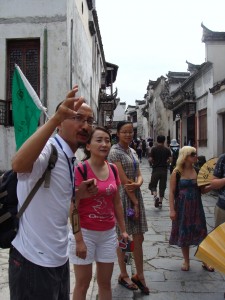
Gary, the local guide from the Huangshan region who stayed with us for this portion of the trip. He is standing next to Dong Xia, one of the two tour guides who stayed with us for the entire length of the trip.
Hongcun also left me with one souvenir which I think is the most treasured one that I’ve bought on this trip so far. On the last day, right before we left, me and two other people purchased a 笛子(dizi) or a Chinese flute carved out of bamboo. There was a shop-owner there that specialized in instrument making, and he was willing to sell us one for 120 RMB ($20 US).
So far, I think I can play a couple songs like Edelweiss (from the Sound of Music), the theme from Princess Mononoke, Do Re Mi (also from the Sound of Music), and Ode to Joy. It’s a really fun instrument to play, and really easy to figure out too.
By the time we left Hongcun, we had definitely left behind some good friends, scenery, and memories there. From playing midnight mah-jongg by the courtyard lake to roller-skating in an abandoned factory building, country-life definitely suited me just fine.
And if you ever visit William and Mary and happen to see me walking around, ask me about my flute, I’d be happy to play you a song or two. 🙂

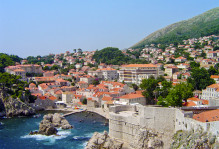
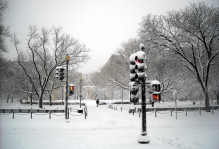
No comments.
Comments are currently closed. Comments are closed on all posts older than one year, and for those in our archive.